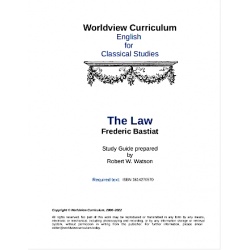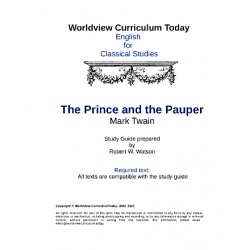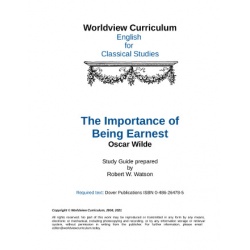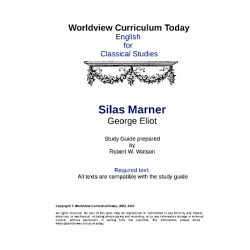19th-century Literature
The Law
Order text here
THE LAW by Frederic Bastiat is the definitive work on the nature and purpose of legislative laws. This book explains concisely and clearly that the great aim of the law is to promote the greatest amount of liberty. If a government truly valued liberty, one would think that every student in the country would be given this small volume and be required to read it at least once a year. But since this is not the case in the United States today, this lack indicates liberty and freedom are not very important values in American politics in spite of the lip service paid to such notions by newspaper editors and politicians.
As Bastiat points out, the rights of life, liberty, and property are God-given gifts which preceded the legislation of any laws by human governments. However, since men are sinners and will try to take away these gifts from others, God ordained civil government to be the minister of justice. The central theme of the Bible is the redemption of God’s creation. And part and parcel with any idea of redemption is the satisfying of a judgment and the escaping from bondage. Therefore, God intends for liberty, not slavery, to be the norm for all mankind.
Whether to live your life as you see fit, to raise your own children without outside interference, or to follow your vocation by employing your talents and gifts, true liberty must always be connected with the liberty under a sovereign God, who redeems mankind and his creation. However, instead of guaranteeing liberty, the law in every nation today is used to oppress and to subjugate the citizens. Even though he uses human reason to make his case for liberty, Bastiat nevertheless reflects the biblical viewpoint of law. As a Frenchman, Bastiat saw firsthand what happens to a country that rejects its religious mores and substitutes them for socialism and rationalism. The result is a flawed worldview that insists that society cannot exist without a centralized state.
As the state achieves the status of a god, which provides for the people and has the power of life and death over the citizens, the church and the home become irrelevant in such a society, as we are seeing in the United States today. The trite cliché, “We still live in the freest country in the world,” is wearing thin. The United States has lost its right to be the standard for liberty or morality many years ago. Like the proverbial frog in a pan of water, we who are born in the water cannot tell that the temperature is slowly rising. We must first get out of the pan and then view the situation from the outside.
Bastiat’s The Law helps us to take an objective look at our present enslavement. You as a member of the human race need to thoughtfully read and study this book. Within your hands is a most timely message that can solve just about every social, economic, and political problem that mankind has, except of course the issue of sin in the individual. The only hope for us as human beings, short of the Lord’s return, is for legions of young and old to renounce the socialistic experiments of the past 200 years and to give liberty a chance once again.
THE LAW by Frederic Bastiat is the definitive work on the nature and purpose of legislative laws. This book explains concisely and clearly that the great aim of the law is to promote the greatest amount of liberty. If a government truly valued liberty, one would think that every student in the country would be given this small volume and be required to read it at least once a year. But since this is not the case in the United States today, this lack indicates liberty and freedom are not very important values in American politics in spite of the lip service paid to such notions by newspaper editors and politicians.
As Bastiat points out, the rights of life, liberty, and property are God-given gifts which preceded the legislation of any laws by human governments. However, since men are sinners and will try to take away these gifts from others, God ordained civil government to be the minister of justice. The central theme of the Bible is the redemption of God’s creation. And part and parcel with any idea of redemption is the satisfying of a judgment and the escaping from bondage. Therefore, God intends for liberty, not slavery, to be the norm for all mankind.
Whether to live your life as you see fit, to raise your own children without outside interference, or to follow your vocation by employing your talents and gifts, true liberty must always be connected with the liberty under a sovereign God, who redeems mankind and his creation. However, instead of guaranteeing liberty, the law in every nation today is used to oppress and to subjugate the citizens. Even though he uses human reason to make his case for liberty, Bastiat nevertheless reflects the biblical viewpoint of law. As a Frenchman, Bastiat saw firsthand what happens to a country that rejects its religious mores and substitutes them for socialism and rationalism. The result is a flawed worldview that insists that society cannot exist without a centralized state.
As the state achieves the status of a god, which provides for the people and has the power of life and death over the citizens, the church and the home become irrelevant in such a society, as we are seeing in the United States today. The trite cliché, “We still live in the freest country in the world,” is wearing thin. The United States has lost its right to be the standard for liberty or morality many years ago. Like the proverbial frog in a pan of water, we who are born in the water cannot tell that the temperature is slowly rising. We must first get out of the pan and then view the situation from the outside.
Bastiat’s The Law helps us to take an objective look at our present enslavement. You as a member of the human race need to thoughtfully read and study this book. Within your hands is a most timely message that can solve just about every social, economic, and political problem that mankind has, except of course the issue of sin in the individual. The only hope for us as human beings, short of the Lord’s return, is for legions of young and old to renounce the socialistic experiments of the past 200 years and to give liberty a chance once again.
Number of lessons: 5; compatible text for study guide: ISBN 1614270570 (you may order the text below). Guide prepared by Robert W. Watson.
The Prince and the Pauper
Order text here
Note: This guide is included in the course, An Introduction to Literature.
Almost every commentator suggests that Mark Twain wrote The Prince and the Pauper as a children’s book in order to gain a younger audience. However, it is dif icult to believe that Twain would write a historical novel merely to entertain young people. Like most authors, Twain wrote with purpose. On the surface, the story appears to be a delightful tale about two boys switching roles by accident. But much deeper are the philosophical and social beliefs which Twain was challenging.
Through The Prince and the Pauper, Twain is clearly attacking two social institutions: one political and the other legal. Twain ridicules the political doctrine of the “divine right of kings”; yet, he is able to do so in an inoffensive manner. While many today laugh at this doctrine, even in Twain’s day, this political idea was no longer taken seriously by most nations.
However, the use of capital punishment for petty crimes was very much in place, not only in England, but in the United States as well. Also, the conditions of prisons as described in the story was not far removed from the prisons in nineteenth‐century America. As you read this tale, notice how Twain succeeds by making the legal system to appear grossly unjust by anyone’s standards.
Note: This guide is included in the course, An Introduction to Literature.
Almost every commentator suggests that Mark Twain wrote The Prince and the Pauper as a children’s book in order to gain a younger audience. However, it is dif icult to believe that Twain would write a historical novel merely to entertain young people. Like most authors, Twain wrote with purpose. On the surface, the story appears to be a delightful tale about two boys switching roles by accident. But much deeper are the philosophical and social beliefs which Twain was challenging.
Through The Prince and the Pauper, Twain is clearly attacking two social institutions: one political and the other legal. Twain ridicules the political doctrine of the “divine right of kings”; yet, he is able to do so in an inoffensive manner. While many today laugh at this doctrine, even in Twain’s day, this political idea was no longer taken seriously by most nations.
However, the use of capital punishment for petty crimes was very much in place, not only in England, but in the United States as well. Also, the conditions of prisons as described in the story was not far removed from the prisons in nineteenth‐century America. As you read this tale, notice how Twain succeeds by making the legal system to appear grossly unjust by anyone’s standards.
Number of lessons: 14; compatible text for study guide: all texts are compatible (you may order the text below). Guide prepared by Robert W. Watson.
The Importance of Being Earnest
Order text here
OSCAR WILDE’S actual name at birth was Oscar Fingall O’Flahertie Wills Wilde—a mouthful by any standard. Wilde wrote several poems, the most famous being “The Ballad of Reading Gaol,” many plays, but only one novel, The Picture of Dorian Gray.
The Importance of Being Earnest has received mixed reviews. George Bernard Shaw stated that the play “amused me, of course; but unless comedy touches me as well as amuses me, it leaves me with a sense of having wasted my evening.”
However, the play is arguably not a comedy, but a farce. If this is so, then a farce is not supposed to “touch” us. The whole idea of the farce is supposed to be absurd in that the silliness in the play must seem to impact the characters in a serious way. In fact, life is viewed as very trivial. When asked what philosophy the play espoused, Wilde expressed, “we should treat all the trivial things of life seriously, and all the serious things of life with sincere and studied triviality.”
The central male characters are bent upon flouting social mores, but the best that we can say about Jack and Algernon is that the one is guilty of laziness and other of gluttony. Yet lying seems to be the primary structure of the play. Jack creates a fictional brother who is an outcast so that he can go to the city from time to time. As for Algernon, he has an imaginative fellow who is called Bunbury, a poor invalid. In addition to these lies, Jack masquerades as Ernest in Act I and Algernon becomes Ernest in Act II. But because of these lies, Jack discovers his true self.
In spite of the façade of wanting to revel in pleasure and wickedness, both men truly desire to find wives. The absurdity is increased when we learn that both Gwendolen and Cecily have rather imaginative diaries. Both of these women want husbands, but under the condition that the man they will marry must have the name of Ernest. Gwendolen believes that the name Ernest represents stability and security, while Cecily associates the name with Jack’s misfit “brother.” The Importance of Being Earnest is unique not only as making fun of society, but arguably of drama during Wilde’s lifetime as well.
OSCAR WILDE’S actual name at birth was Oscar Fingall O’Flahertie Wills Wilde—a mouthful by any standard. Wilde wrote several poems, the most famous being “The Ballad of Reading Gaol,” many plays, but only one novel, The Picture of Dorian Gray.
The Importance of Being Earnest has received mixed reviews. George Bernard Shaw stated that the play “amused me, of course; but unless comedy touches me as well as amuses me, it leaves me with a sense of having wasted my evening.”
However, the play is arguably not a comedy, but a farce. If this is so, then a farce is not supposed to “touch” us. The whole idea of the farce is supposed to be absurd in that the silliness in the play must seem to impact the characters in a serious way. In fact, life is viewed as very trivial. When asked what philosophy the play espoused, Wilde expressed, “we should treat all the trivial things of life seriously, and all the serious things of life with sincere and studied triviality.”
The central male characters are bent upon flouting social mores, but the best that we can say about Jack and Algernon is that the one is guilty of laziness and other of gluttony. Yet lying seems to be the primary structure of the play. Jack creates a fictional brother who is an outcast so that he can go to the city from time to time. As for Algernon, he has an imaginative fellow who is called Bunbury, a poor invalid. In addition to these lies, Jack masquerades as Ernest in Act I and Algernon becomes Ernest in Act II. But because of these lies, Jack discovers his true self.
In spite of the façade of wanting to revel in pleasure and wickedness, both men truly desire to find wives. The absurdity is increased when we learn that both Gwendolen and Cecily have rather imaginative diaries. Both of these women want husbands, but under the condition that the man they will marry must have the name of Ernest. Gwendolen believes that the name Ernest represents stability and security, while Cecily associates the name with Jack’s misfit “brother.” The Importance of Being Earnest is unique not only as making fun of society, but arguably of drama during Wilde’s lifetime as well.
Number of lessons: 5; compatible text for study guide: Dover Publications ISBN 0486264785 (you may order the text below). Guide prepared by Robert W. Watson.
Silas Marner
Order text here
Note: This guide is included in the course, Introduction to Literature.
Silas Marner has a rather straight-forward plot. However, the novel employs sufficient drama and suspense to maintain the reader’s interest. George Eliot wrote about the way of life that she knew best—the English countryside with the small towns and villages. This novel will give you an insight about the manner of living among country folks in England during the early nineteenth century.
What is especially good about Silas Marner is the characters are believable and many of them undergo personal and moral changes. Indeed, the most dynamic character, Silas Marner himself, commands our interest, pity, and admiration throughout the novel.
The story is about injustice, the consequences of sin, and finally, the righting of wrong. This novel is a step up from many other novels. Silas Marner is not for merely entertaining the reader. George Eliot introduces a lot of intellectual content that is designed to make us reflect and consider our own hearts. There is much to learn within the pages of this book. Read this novel thoughtfully and carefully.
Note: This guide is included in the course, Introduction to Literature.
Silas Marner has a rather straight-forward plot. However, the novel employs sufficient drama and suspense to maintain the reader’s interest. George Eliot wrote about the way of life that she knew best—the English countryside with the small towns and villages. This novel will give you an insight about the manner of living among country folks in England during the early nineteenth century.
What is especially good about Silas Marner is the characters are believable and many of them undergo personal and moral changes. Indeed, the most dynamic character, Silas Marner himself, commands our interest, pity, and admiration throughout the novel.
The story is about injustice, the consequences of sin, and finally, the righting of wrong. This novel is a step up from many other novels. Silas Marner is not for merely entertaining the reader. George Eliot introduces a lot of intellectual content that is designed to make us reflect and consider our own hearts. There is much to learn within the pages of this book. Read this novel thoughtfully and carefully.
Number of lessons: 9; compatible text for study guide: all texts are compatible (you may order the text below). Guide prepared by Robert W. Watson.
- 1




